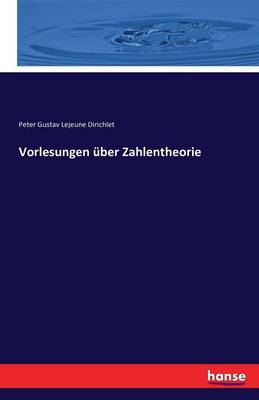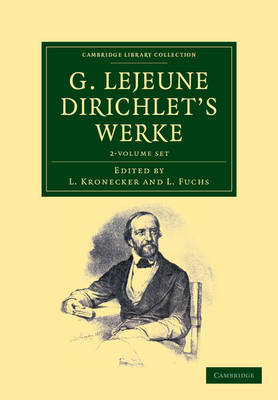Cambridge Library Collection - Mathematics
1 primary work • 4 total works
Volume 2
The great nineteenth-century mathematician Peter Gustav Lejeune Dirichlet (1805-59) studied in Paris, coming under the influence of scholars including Fourier and Legendre. He then taught at Berlin and Goettingen universities, where he was the successor to Gauss and mentor to Riemann and Dedekind. His achievements include the first satisfactory proof of the convergence of Fourier series under appropriate conditions, and the theorem on primes in arithmetic progression which was, at the same time, the foundation of analytic number theory and one of its greatest achievements. He also did important work on Laplace's equation, the theory of series and many other topics. This two-volume collection of his works, published 1889-97, was compiled by Leopold Kronecker (1823-91). Volume 2 was completed by Lazarus Fuchs (1833-1902) and contains Dirichlet's publications from 1844 onwards, together with some unpublished papers and selected correspondence with Gauss, Alexander von Humboldt and Kronecker.
Peter Gustav Lejeune Dirichlet (1805-59) may be considered the father of modern number theory. He studied in Paris, coming under the influence of mathematicians like Fourier and Legendre, and then taught at Berlin and Goettingen universities, where he was the successor to Gauss. This book contains lectures on number theory given by Dirichlet in 1856-7. They include his famous proofs of the class number theorem for binary quadratic forms and the existence of an infinity of primes in every appropriate arithmetical progression. The material was first published in 1863 by Richard Dedekind (1831-1916), professor at Braunschweig, who had been a junior colleague of Dirichlet at Goettingen. The second edition appeared in 1871; this reissue is of the third, revised and expanded, edition of 1879; a fourth edition appeared as late as 1894. The appendices contain further work by both Dirichlet and Dedekind.
The great nineteenth-century mathematician Peter Gustav Lejeune Dirichlet (1805-59) studied in Paris, coming under the influence of scholars including Fourier and Legendre. He then taught at Berlin and Goettingen universities, where he was the successor to Gauss and mentor to Riemann and Dedekind. His achievements include the first satisfactory proof of the convergence of Fourier series under appropriate conditions, and the theorem on primes in arithmetic progression which was, at the same time, the foundation of analytic number theory and one of its greatest achievements. He also did important work on Laplace's equation, the theory of series and many other topics. This two-volume collection of his works, published 1889-97, was compiled by Leopold Kronecker (1823-91). Volume 1 contains works published by Dirichlet up to 1843, together with a related 1846 essay.
The great nineteenth-century mathematician Peter Gustav Lejeune Dirichlet (1805-59) studied in Paris, coming under the influence of scholars including Fourier and Legendre. He then taught at Berlin and Goettingen universities, where he was the successor to Gauss and mentor to Riemann and Dedekind. His achievements include the first satisfactory proof of the convergence of Fourier series under appropriate conditions, and the theorem on primes in arithmetic progression which was, at the same time, the foundation of analytic number theory and one of its greatest achievements. He also did important work on Laplace's equation, the theory of series and many other topics. This two-volume collection of his works, published 1889-97, was compiled by Leopold Kronecker (1823-91). Volume 1 contains works published by Dirichlet up to 1843 and a related 1846 essay. Volume 2, completed by Lazarus Fuchs (1833-1902), contains Dirichlet's later publications, unpublished papers and selected correspondence.


